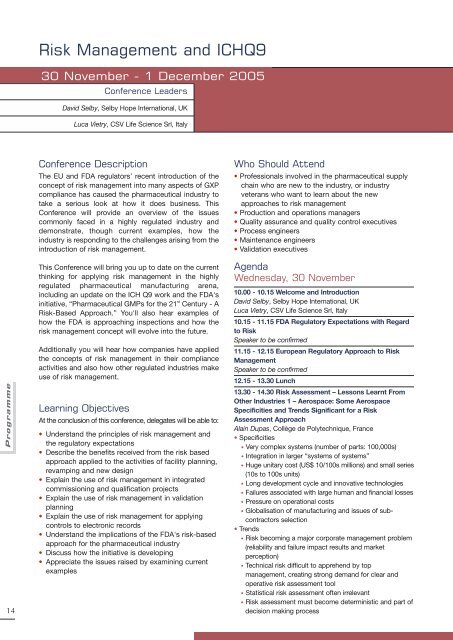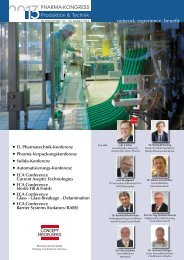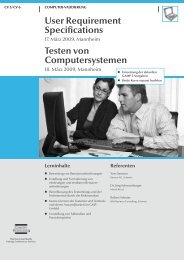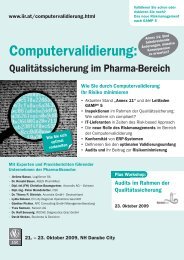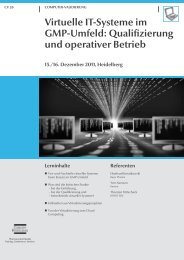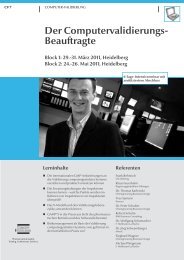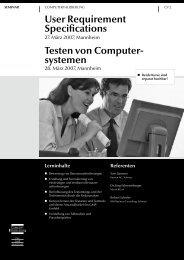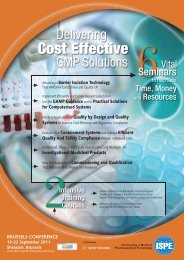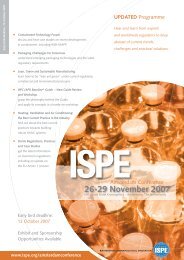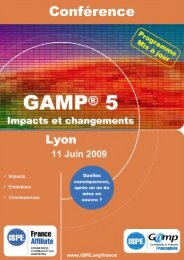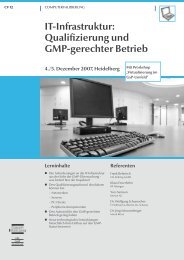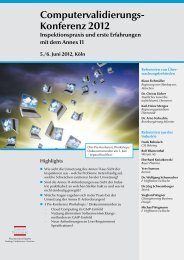ISPE Milan Conferences - Kereon AG
ISPE Milan Conferences - Kereon AG
ISPE Milan Conferences - Kereon AG
Create successful ePaper yourself
Turn your PDF publications into a flip-book with our unique Google optimized e-Paper software.
Risk Management and ICHQ9<br />
30 November - 1 December 2005<br />
Conference Leaders<br />
David Selby, Selby Hope International, UK<br />
Luca Vietry, CSV Life Science Srl, Italy<br />
Programme<br />
14<br />
Conference Description<br />
The EU and FDA regulators’ recent introduction of the<br />
concept of risk management into many aspects of GXP<br />
compliance has caused the pharmaceutical industry to<br />
take a serious look at how it does business. This<br />
Conference will provide an overview of the issues<br />
commonly faced in a highly regulated industry and<br />
demonstrate, though current examples, how the<br />
industry is responding to the challenges arising from the<br />
introduction of risk management.<br />
This Conference will bring you up to date on the current<br />
thinking for applying risk management in the highly<br />
regulated pharmaceutical manufacturing arena,<br />
including an update on the ICH Q9 work and the FDA's<br />
initiative, “Pharmaceutical GMPs for the 21 st Century - A<br />
Risk-Based Approach.” You'll also hear examples of<br />
how the FDA is approaching inspections and how the<br />
risk management concept will evolve into the future.<br />
Additionally you will hear how companies have applied<br />
the concepts of risk management in their compliance<br />
activities and also how other regulated industries make<br />
use of risk management.<br />
Learning Objectives<br />
At the conclusion of this conference, delegates will be able to:<br />
• Understand the principles of risk management and<br />
the regulatory expectations<br />
• Describe the benefits received from the risk based<br />
approach applied to the activities of facility planning,<br />
revamping and new design<br />
• Explain the use of risk management in integrated<br />
commissioning and qualification projects<br />
• Explain the use of risk management in validation<br />
planning<br />
• Explain the use of risk management for applying<br />
controls to electronic records<br />
• Understand the implications of the FDA's risk-based<br />
approach for the pharmaceutical industry<br />
• Discuss how the initiative is developing<br />
• Appreciate the issues raised by examining current<br />
examples<br />
Who Should Attend<br />
• Professionals involved in the pharmaceutical supply<br />
chain who are new to the industry, or industry<br />
veterans who want to learn about the new<br />
approaches to risk management<br />
• Production and operations managers<br />
• Quality assurance and quality control executives<br />
• Process engineers<br />
• Maintenance engineers<br />
• Validation executives<br />
Agenda<br />
Wednesday, 30 November<br />
10.00 - 10.15 Welcome and Introduction<br />
David Selby, Selby Hope International, UK<br />
Luca Vietry, CSV Life Science Srl, Italy<br />
10.15 - 11.15 FDA Regulatory Expectations with Regard<br />
to Risk<br />
Speaker to be confirmed<br />
11.15 - 12.15 European Regulatory Approach to Risk<br />
Management<br />
Speaker to be confirmed<br />
12.15 - 13.30 Lunch<br />
13.30 - 14.30 Risk Assessment – Lessons Learnt From<br />
Other Industries 1 – Aerospace: Some Aerospace<br />
Specificities and Trends Significant for a Risk<br />
Assessment Approach<br />
Alain Dupas, Collège de Polytechnique, France<br />
• Specificities<br />
• Very complex systems (number of parts: 100,000s)<br />
• Integration in larger “systems of systems”<br />
• Huge unitary cost (US$ 10/100s millions) and small series<br />
(10s to 100s units)<br />
• Long development cycle and innovative technologies<br />
• Failures associated with large human and financial losses<br />
• Pressure on operational costs<br />
• Globalisation of manufacturing and issues of subcontractors<br />
selection<br />
• Trends<br />
• Risk becoming a major corporate management problem<br />
(reliability and failure impact results and market<br />
perception)<br />
• Technical risk difficult to apprehend by top<br />
management, creating strong demand for clear and<br />
operative risk assessment tool<br />
• Statistical risk assessment often irrelevant<br />
• Risk assessment must become deterministic and part of<br />
decision making process


